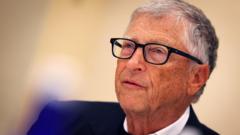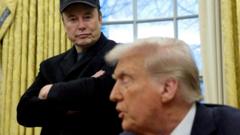Gates aims to eliminate diseases and poverty as he speeds up his philanthropic efforts
Bill Gates to Donate 99% of His Wealth Over Next Two Decades

Bill Gates to Donate 99% of His Wealth Over Next Two Decades
Microsoft founder accelerates charitable giving, planning to dissolve foundation by 2045
Bill Gates, co-founder of Microsoft, has announced his intention to donate 99% of his wealth within the next 20 years. In a recent blog post, Gates outlined his plans to fast-track charitable contributions through his foundation, which he envisions shutting down by 2045. He expressed his desire to be remembered not for his wealth at death but for his philanthropy.
The 69-year-old philanthropist stated that his foundation has already contributed $100 billion towards health and development issues and forecasted an additional $200 billion in spending over the coming two decades, contingent on market conditions and inflation rates. Gates referenced a well-known essay by industrialist Andrew Carnegie, emphasizing the moral obligation of the wealthy to return fortunes to society, stating, “the man who dies thus rich dies disgraced."
This latest promise marks a notable shift in Gates’ charitable strategy; he and his ex-wife Melinda had originally planned for their foundation to operate for several decades posthumously. Despite this generosity, it’s likely that Gates’ giving could still leave him as a billionaire, given his current net worth of $108 billion. His blog contained a visual representation of his monetary trajectory, illustrating a decline from his current wealth to nearly zero by 2045.
Gates, who diminished his involvement with Microsoft over the past two decades, also expressed concerns over cuts to foreign aid from developed nations, criticizing the US, UK, and France for reducing assistance budgets. He vowed that the Gates Foundation would continue to support global efforts aimed at helping impoverished communities, even amid geopolitical shifts.
In an interview with the Financial Times, Gates leveled criticism at Elon Musk, attributing adverse effects on vulnerable populations to budget cuts made under Musk's leadership in his government role. Gates emphasized the real-world consequences of such decisions, calling for more robust support for international aid programs. He stated, “The picture of the world's richest man killing the world's poorest children is not a pretty one,” drawing attention to the tangible implications of funding reductions.
The Gates Foundation, known for its significant philanthropic contributions, continues to engage in vital health initiatives globally, with a focus on eliminating preventable diseases affecting mothers and children, as well as combating poverty. Despite facing criticism regarding its influence over global health systems and leveraging its charitable status for tax benefits, the foundation prioritizes critical issues that directly impact underprivileged communities.
The 69-year-old philanthropist stated that his foundation has already contributed $100 billion towards health and development issues and forecasted an additional $200 billion in spending over the coming two decades, contingent on market conditions and inflation rates. Gates referenced a well-known essay by industrialist Andrew Carnegie, emphasizing the moral obligation of the wealthy to return fortunes to society, stating, “the man who dies thus rich dies disgraced."
This latest promise marks a notable shift in Gates’ charitable strategy; he and his ex-wife Melinda had originally planned for their foundation to operate for several decades posthumously. Despite this generosity, it’s likely that Gates’ giving could still leave him as a billionaire, given his current net worth of $108 billion. His blog contained a visual representation of his monetary trajectory, illustrating a decline from his current wealth to nearly zero by 2045.
Gates, who diminished his involvement with Microsoft over the past two decades, also expressed concerns over cuts to foreign aid from developed nations, criticizing the US, UK, and France for reducing assistance budgets. He vowed that the Gates Foundation would continue to support global efforts aimed at helping impoverished communities, even amid geopolitical shifts.
In an interview with the Financial Times, Gates leveled criticism at Elon Musk, attributing adverse effects on vulnerable populations to budget cuts made under Musk's leadership in his government role. Gates emphasized the real-world consequences of such decisions, calling for more robust support for international aid programs. He stated, “The picture of the world's richest man killing the world's poorest children is not a pretty one,” drawing attention to the tangible implications of funding reductions.
The Gates Foundation, known for its significant philanthropic contributions, continues to engage in vital health initiatives globally, with a focus on eliminating preventable diseases affecting mothers and children, as well as combating poverty. Despite facing criticism regarding its influence over global health systems and leveraging its charitable status for tax benefits, the foundation prioritizes critical issues that directly impact underprivileged communities.



















